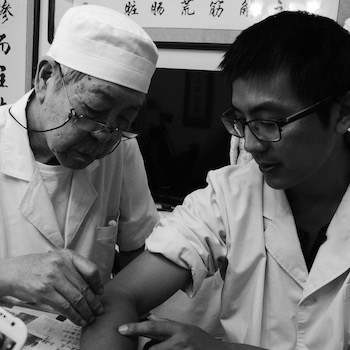
The best teachers are perpetual students. They are ones who when things don’t work as expected don’t say the medicine doesn’t work. These people dig into finding out why they don’t yet know how to make it work.
While aspects of medicine can be taught, there is much more than can only be discovered. Discovered anew within the experience of each generation. And it is those teachers who can help us along in that this kind of learning to learn who set us off on a life-long voyage of discovery.
In this conversation we listen into one practitioner’s apprentice experience with Dr Wang Ju Yi and the path of practice that it opened up.
When palpating channels it is easier to feel abnormal changes, such as lumps, in the fleshier parts. However, it is also important to carefully palpate the more distal parts of the channels. In these regions the changes are generally more subtle and easy to miss. For example, in the PC-7 to PC-6 regions we often feel small stick-like changes. In spite of their small size, these changes are clinically relevant. Changes around PC-7, for instance, often present symptoms related to constrained heat in the pericardium, such as irritability. For this kind of patient, Dr. Wang’s PC-7 and LR-2 is an excellent point pair that clears constrained heat in the jue yin.

Jonathan Chang
Over ten years ago, I was introduced to Dr. Wang Ju-yi by a Chinese American friend who at the time was studying Applied Channel Theory. I went to Dr. Wang for acupuncture treatments, and I still remember how relaxed I felt the moment I walked into his clinic. He carried himself with a warmth and conscientiousness, that was the spark that changed the entire direction of my life.
In 2007, I enrolled in the Beijing University of Chinese Medicine, while also beginning my studies with Dr. Wang in 2008. The foundational knowledge provided by my university studies was essential, but it was the time I spent with Dr. Wang – nine years in total, that developed my passion for TCM. From Dr. Wang, I learned a lot of practical clinical skills, such as channel palpation. In addition, he taught me how to properly think about Chinese medical theory, especially channel theory.
From 2012 until Dr. Wang’s passing last August, I was his main assistant. Over time, I realized that I had a growing responsibility to pass on his teachings to future generations. In addition to teaching Applied Channel Theory to students in China and abroad, I also helped work on two of Dr. Wang’s Chinese books, An Introduction to Applied Channel Theory (《经络医学概论》) and Wang Ju-yi’s Case Studies in Applied Channel Theory (《王居易针灸医案讲习录》). Both of these books are being translated into English.
I have been working at the Ling Lan TCM Clinic in Beijing. Like all students of Dr. Wang, we all have come to the conclusion that if we don’t palpate the channels, we won’t know how to proceed with the treatment. Channel palpation helps to clarify the diagnosis, which leads to better clinical results. There are always fascinating things that happen when using Applied Channel Theory, which keeps me motivated to focus on this approach and deepen my understanding of it.
Learn more about channel palpation and how it can help to inform your clinical work
If you like Facebook then visit Wang Ju-yi’s Applied Channel Theory